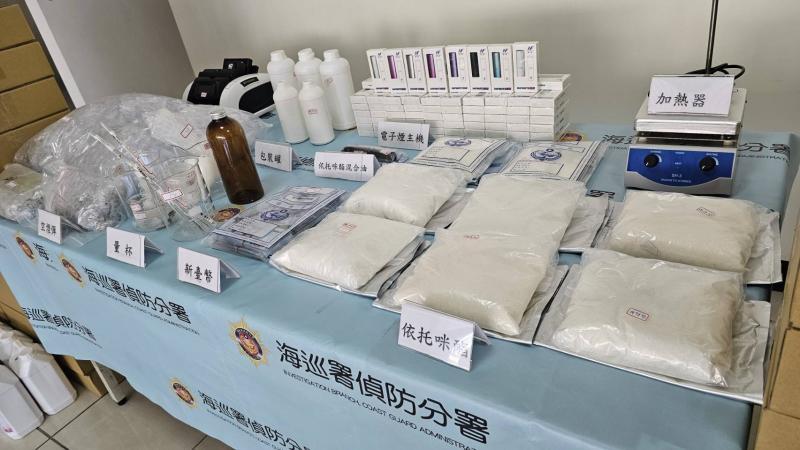The Executive Yuan today approved a Ministry of Justice narcotics review committee plan to reclassify etomidate, also known as the “zombie vape” drug, as a Category 2 narcotic to strengthen law enforcement efforts.
“Zombie vapes” use etomidate, a type of central nervous system depressant that can induce anesthesia.
In a news conference following the Cabinet meeting, Deputy Minister of Justice Huang Shih-chieh (黃世杰) said that simple possession of the drug would be a criminal offense.

Photo: Chiu Chun-fu, Taipei Times
Reclassification to Category 2 means increased penalties for manufacturing, trafficking, transporting and selling etomidate when compared to Category 3 drugs, Huang said.
This also means that possession or using it also qualifies as a crime, Huang added.
According to the Narcotics Hazard Prevention Act (毒品危害防制條例), those convicted of using Category 2 narcotics shall be punished with a maximum three-year fixed-term imprisonment.
Those convicted of possessing it shall be punished with a maximum two-year fixed-term imprisonment, detention or a fine of no more than NT$200,000 (US$6,142).
Offenders of manufacturing, transporting or selling Category 2 narcotics are subject to life imprisonment or a minimum 10-year fixed-term imprisonment, and may also be subject to a fine of no more than NT$15 million.
There have recently been several high-profile cases of the growing issue of “zombie vapes.”
On Sunday, a conscript was found in a military training center with 50 cartridges, and earlier this year, police officers were killed by drivers who were under the drug’s influence.
In related news, the Executive Yuan passed a new phase of its anti-drug strategy plan, which calls for the government to invest NT$15 billion on anti-drug enforcement efforts.
The funds would go toward reducing supply of new drugs such as etomidate, as well as limiting access to the chemicals needed to create them.
Part of the plan is to incorporate high-tech detection methods to crack down on Internet-based drug trafficking, with the strategy also calling for cross-border cooperation and intelligence sharing.
The Taiwan High Prosecutors' Office is integrating anti-drug resources into its six major enforcement agencies to ensure source tracking and cross-agency cooperation, he said.
For serious cases involving the drug, prosecutors would also push to seize the proceeds, he added.
Since etomidate is mostly consumed in vape form, authorities in the Ministry of Health and Welfare are coordinating with law enforcement to limit the spread of such devices under the Tobacco Hazards Prevention Act (菸害防制法).

Civil society groups yesterday protested outside the Legislative Yuan, decrying Chinese Nationalist Party (KMT) efforts to pass three major bills that they said would seriously harm Taiwan’s democracy, and called to oust KMT caucus whip Fu Kun-chi (傅?萁). It was the second night of the three-day “Bluebird wintertime action” protests in Taipei, with organizers announcing that 8,000 people attended. Organized by Taiwan Citizen Front, the Economic Democracy Union (EDU) and a coalition of civil groups, about 6,000 people began a demonstration in front of KMT party headquarters in Taipei on Wednesday, organizers said. For the third day, the organizers asked people to assemble

POOR IMPLEMENTATION: Teachers welcomed the suspension, saying that the scheme disrupted school schedules, quality of learning and the milk market A policy to offer free milk to all school-age children nationwide is to be suspended next year due to multiple problems arising from implementation of the policy, the Executive Yuan announced yesterday. The policy was designed to increase the calcium intake of school-age children in Taiwan by drinking milk, as more than 80 percent drink less than 240ml per day. The recommended amount is 480ml. It was also implemented to help Taiwanese dairy farmers counter competition from fresh milk produced in New Zealand, which is to be imported to Taiwan tariff-free next year when the Agreement Between New Zealand and

‘NEW NORMAL’: A Japanese official said the drills show that the PLA can carry out large maneuvers without announcement, ‘leaving all of us struggling to respond’ Beijing’s recent naval exercises have left Taiwan and the US “struggling” for a response as the two nations drew different conclusions about the implications of the Chinese military drills, the Financial Times (FT) reported on Sunday. Taiwan has been bracing for China to hold military drills to retaliate against President William Lai’s (賴清德) diplomatic visits abroad, the outlet said, referring to Lai’s Nov. 30 to Dec. 6 tour to Taiwan’s three South Pacific allies, which included stopovers in Hawaii and Guam. Beijing announced partial air traffic restrictions across seven time zones along its coast from Shanghai to Hong Kong over two days. Yet,

CONNECTED: A survey of students from third grade to university seniors showed that 80% had cellphones, spending on average 37.27 hours per week on them Line users in Taiwan made an average of 100 million voice or video calls each day this year, while “like/thumbs up” was the most frequently used emoji in reaction to a message on the service, the Tokyo-based operator of the messaging app said yesterday. The app’s ability to adjust the quality of video and voice calls helps contribute to its frequent use, LY Corp said in a statement. As of Nov. 30, Line users in Taiwan spent an average of about one hour per day on the app, often checking it in the morning for messages that might have come through overnight,